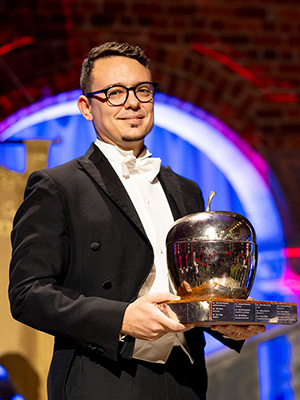Paris Carbone is Teacher of the Year

He was destined to go for a career in music, until he discovered programming and computer science. Now, the student union at KTH has awarded Associate Professor Paris Carbone the title as teacher of the year for his experimental and innovative teaching methodology.
“Funny enough, I learned about the final award decision during my birthday night, so it really was a very special present I will always remember!”
Paris Carbone is a KTH researcher and teacher in data systems. He feels both honoured and grateful for the award, especially towards the teaching assistants, PhD students and fellow professors with whom he collaborated. Most of all, he is thankful towards his students.
“Students are really the toughest critics of every professor. They are pure, driven only by learning motives and judge based on the effectiveness of our teachings in their lives. No research agenda, politics, or lobbying can influence their opinion,” Paris Carbone says.
The Associate Professor with the Greek-Italian family has only taught for five years. Research was his sole focus for a long time, and Paris Carbone did not think teaching was for him.
“Then, during my tenure track at KTH, I suddenly had to take teaching seriously for real since I became course responsible. That was a challenge since I had no clue how to make this right. During this time, I started becoming curious about teaching methods, trying to identify the essence of the art.”
Found his teaching style

Paris Carbone took KTH teaching courses, interviewed faculty and (in his own words) “spammed students” with weekly questionnaires, asking them what they would like to see and what they would change. Through this process and with much experimentation, he found his much-appreciated teaching style.
“Getting such an overwhelmingly positive perception means that the new methods we developed in the way really made an impact, and yet, this is only the beginning.”
Paris Carbone’s courses start with a theatrical skit introducing the main concepts. His content supports self-paced studying, with recorded live lectures, shorter video versions, practice quizzes with feedback, and automated correctness checkers for programming assignments. There are guest industry seminars and exclusive deep dive seminars detailing real-world data systems that our team has contributed to in the past.
“This last part is quite essential according to many students, stating that they feel privileged to learn all these deeply hidden insights and be part of an inclusive learning environment that contains valuable knowledge not taught in any other top university in the world,” Paris Carbone says.
Trial and error
Some of the methods Paris Carbone tried failed, while others succeeded. One highlight was the adoption of open forums for direct, transparent, anonymous communication with the students. Anonymity works well since it takes the stress away for students afraid to ask or say what is on their minds. Another method that Paris Carbone thinks all professors should use is to get to know their students better in the very beginning and identify their goals, fears and aspirations.
“Society is changing rapidly year by year and students are a perfect reflection of the current technological trends, political changes, market and culture. One’s previous teaching methods can eventually become ineffective if you do not adapt.”
Text: Jon Lindhe (jlindhe@kth.se)
